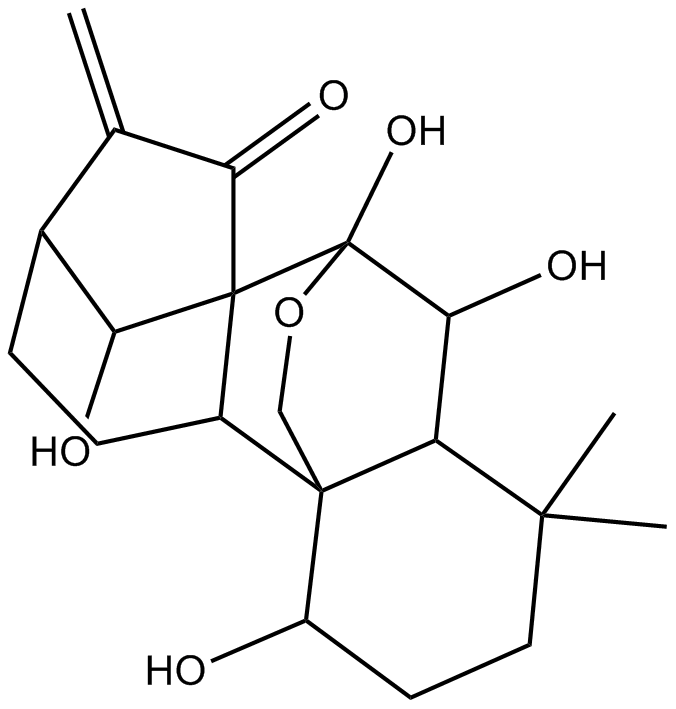Oridonin (Synonyms: NSC 250682) |
| Catalog No.GN10692 |
Un diterpenoide con propiedades antiinflamatorias y anticancerígenas.
Products are for research use only. Not for human use. We do not sell to patients.

Cas No.: 28957-04-2
Sample solution is provided at 25 µL, 10mM.
Oridonin is an inhibitor of protein kinase B (AKT; PKB), with IC50 values of 8.4 and 8.9μM for AKT1 and AKT2 respectively [1]. Oridonin preferentially blocks AKT kinase activity by inhibiting the phosphorylation of AKT substrates, thereby inhibiting downstream mTOR signaling [2]. Oridonin is also a high-affinity NLRP3 inflammasome inhibitor. Oridonin A can also inhibit NF-κB or MAPK activation [3].
In vitro, oridonin (1μM) treated breast cancer cell lines for three weeks, selectively inhibited the clonal growth of p-AKT High (MDAMB468, SKBR3 and HCC1569) cells but not p-AKT low (MDAMB231 and MCF- 10A) cells[2]. Incubation of A431 cells with oridonin (5, 20, 40 or 80 μM) resulted in a significant increase in cell death in a dose-dependent manner, inhibited total tyrosine kinase activity, and downregulated EGFR expression or EGFR phosphorylation [4]. Oridonin (5, 10, 20 μM) incubated OSCC cells dose-dependently led to cell apoptosis and induced cell cycle arrest in the G2/M phase [5].
In vivo, oral treatment of oridonin (160 mg/kg) in SCID mice transplanted with EG9 and HEG18 tumor cells significantly inhibited tumor growth without causing weight loss[1]. Oridonin (20 mg/kg), through intraperitoneal injection, significantly reduced the production of IL-1β in the joint tissue of wild-type C57BL/6 mice and alleviated acute joint swelling[3]. Intraperitoneal injection of oridonin (15 mg/kg) in xenograft mice inhibited the growth of colon cancer cells, significantly down-regulated the protein levels of GLUT1 and MCT1, inhibited glucose uptake and reduced lactate output, thereby inducing metabolic imbalance [6] .
References:
[1] Song M , Liu X , Liu K ,et al.Targeting AKT with oridonin inhibits growth of esophageal squamous cell carcinoma in vitro and patient derived xenografts in vivo[J].Molecular Cancer Therapeutics, 2018.
[2] Sun B, Wang G, Liu H, et al. Oridonin inhibits aberrant AKT activation in breast cancer[J]. Oncotarget, 2018, 9(35): 23878.
[3] He H, Jiang H, Chen Y, et al. Oridonin is a covalent NLRP3 inhibitor with strong anti-inflammasome activity[J]. Nature communications, 2018, 9(1): 2550.
[4] Li D , Wu L J , Tashiro S I , et al.Oridonin Inhibited the Tyrosine Kinase Activity and Induced Apoptosis in Human Epidermoid Carcinoma A431 Cells[J].Biological & Pharmaceutical Bulletin, 2007, 30(2):254-260.
[5] Wang H, Zhu L, Feng X, et al. Oridonin induces G2/M cell cycle arrest and apoptosis in human oral squamous cell carcinoma[J]. European Journal of Pharmacology, 2017, 815: 282-289.
[6]Yao Z, Xie F, Li M, et al. Oridonin induces autophagy via inhibition of glucose metabolism in p53-mutated colorectal cancer cells[J]. Cell death & disease, 2017, 8(2): e2633-e2633.
Average Rating: 5 (Based on Reviews and 30 reference(s) in Google Scholar.)
GLPBIO products are for RESEARCH USE ONLY. Please make sure your review or question is research based.
Required fields are marked with *




